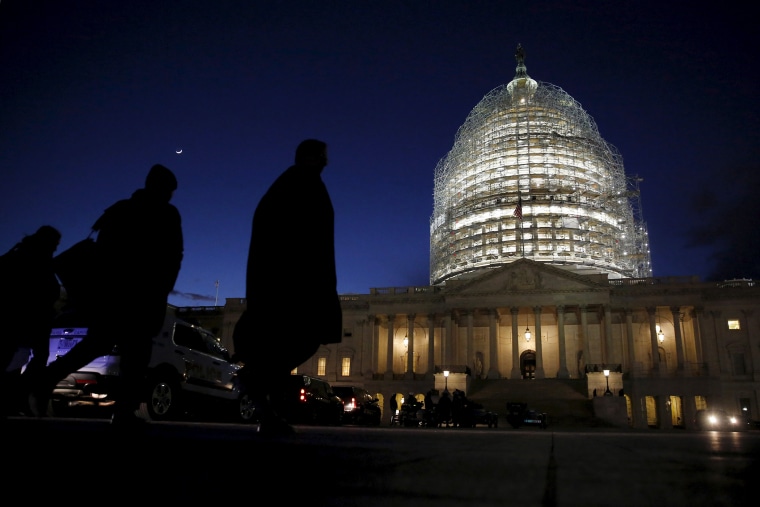The arithmetic on the Senate Republicans' Supreme Court blockade certainly leans in the party's favor. The GOP conference has a 54-member majority. If there's a filibuster against Judge Merrick Garland, as seems likely, he would need 60 votes to have a chance at confirmation.
Are there 14 Republican senators who might break ranks and join with 46 Democrats to advance Garland's nomination? Objectively, it's difficult to imagine such circumstances -- so long as the far-right GOP conference sticks together, linking arms on a gambit never before tried in American history, odds are Republicans will succeed in blocking the same Supreme Court nominee some GOP senators urged President Obama to choose.
But as the process continues to unfold, there's at least some evidence that Republicans are not yet united. The Washington Post reported yesterday:
A third Republican senator broke with party leadership this week to say that Supreme Court nominee Merrick B. Garland ought to be granted hearings, according to a news report. The Garden City Telegram reported that Sen. Jerry Moran (R-Kan.) told a small group gathered in a Cimarron, Kan., courthouse on Monday that GOP senators "should interview Garland and have a hearing on his nomination," in the paper's words.
According to the local report, Moran said he expects to oppose Garland's nomination, but the senator nevertheless believes "the process ought to go forward." In a separate local report, the Kansas Republican was also quoted saying, "I think we have the responsibility to have a hearing, to have the conversation and to make a determination on the merit."
Before yesterday, only Sens. Susan Collins (R-Maine) and Mark Kirk (R-Ill.) had endorsed confirmation hearings for Garland. Moran, a former chairman of the National Republican Senatorial Committee who also happens to be up for re-election this year, has joined a very small club.
Keep in mind, there are basically three elements of the GOP strategy: (1) no one-on-one meetings with Garland; (2) no Senate Judiciary Committee hearings to consider Garland; and (3) no confirmation votes on Garland's nomination. We've seen some cracks in the Republicans' facade on the first point, with 12 of the 54 GOP senators saying they're willing to pay Garland the courtesy of an informal conversation, if only to tell him that they plan to crush his nomination.
This second point represents a far more difficult hurdle, but few would have expected Moran, representing one of the nation's reddest red states, to publicly endorse hearings, so perhaps there's more fluidity to the blockade than previously believed. (Moran is not, by the way, a member of the Judiciary Committee, and he has no influence over whether or not the panel schedules a hearing.)
As for public attitudes, there's been quite a bit of polling released this week, and all of it says roughly the same thing: most Americans oppose the Republicans' blockade and believe the Senate should move forward with the confirmation process.
That said, the details matter: a new CNN poll, released this morning, reported, "Most Americans, 57%, say the choice for the next justice should rest with Obama and not with the next president, and a similar majority, 58%, say that senators who believe the seat should be filled by the next president would not be justified in voting against Garland for that reason." But look closer and you'll notice that most Republican voters believe the exact opposite.
Will GOP senators be more inclined to listen to the American mainstream or their own Republican base? If recent history is any guide, it's not even a close call.
Postscript: In case you missed it, Vice President Biden delivered a compelling speech yesterday on this mess, making the case that Republicans are creating a "genuine constitutional crisis." As for a favorite GOP taking point, he added, "It's frankly ridiculous ... there is no Biden Rule."
